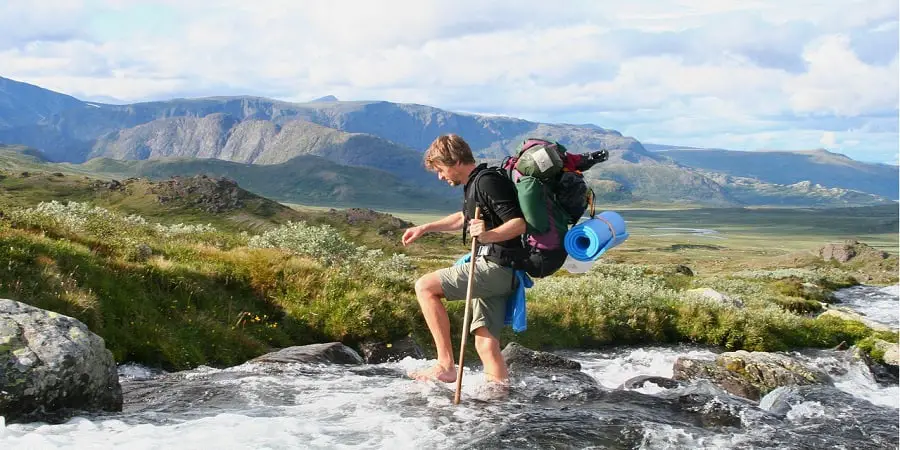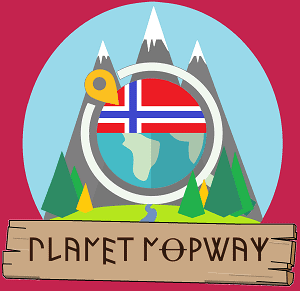All people and their cultures have something that others find strange or weird. Norwegians are no exception. Growing up, everything Norwegian just seemed normal.
Over the years I have lived abroad and got to experience new cultures and other people. In addition to learning more about the rest of the world, it has made me realize that Norwegians are kinda strange.
There are plenty of weird Norwegian habits and customs. Everything from the whole nation being crazy about skiing, or that Friday night is the designated taco night of the week, and everything in between. Here are my top 8 weird Norwegian habits.

Skiing
Let’s kick it off with the obvious one. Skiing is Norway’s national sport and we are good at it. Originally emerging as a means of transport in Telemark, it is now a leisure and sports activity.
It is said that Norwegians are born with skis on their feet. While this is not completely true, the degree to which the population can and will go skiing is fascinating, admirable, and weird at the same time.
While many Norwegians don’t find the time to go skiing that much, you would be considered weird If you don’t physically know how to ski.
Foreigners can breathe a sigh of relief though, we don’t expect you to go skiing. That being said, nothing warms a Norwegian heart more than to see foreigners give their national sport a try.
Being dependent on the Weather
The weather in Norway can be harsh. The winters are long and dark, and the summers can be cold. This is a bad combination for Norwegians who love to go outside for a hike or grab a drink at an outdoor cafe or restaurant.
This combination makes for a fascinating phenomenon, especially during spring and summer. After months of long, dark nights, Norwegians are eager to crawl out of their lair as soon as the weather is good enough.
Therefore, as soon as there is a bright, sunny, and temperate spring day, cities and towns will explode with people as a flower explodes into full bloom.
While this is not an exclusive Norwegian phenomenon, it is something I’ve found to be very noticeable in Norway after living several years abroad in more temperate parts of Europe.
Using Snus
Moving over to an unhealthy habit we share with our neighbors, the Swedes. Smoking is on the decline in Norway, however, that does not mean that the use of tobacco declines at the same rate.
A large reason for this is the widespread use of snus as an alternative to smoking. Snus is a type of smokeless, ground tobacco that is placed under the lip. It somewhat resembles chewing tobacco, except that you don’t really chew on it.
It originated in Sweden in the early 18th century and is now used throughout Norway and Sweden. In Norway, snus has now replaced smoke as the most widely used tobacco product.
While using snus is less harmful than smoking cigarettes, it is gross and weird, and not good for your gums and teeth. Also, users get just as addicted to snus as cigarettes. This is a habit we could do fine without.
Making Friday night, taco night
Moving on to something more cheerful and strange. Ever since old el Paso from general mills was imported to Norway in 1970, Tacos have gradually made their way into Norwegian households all across the nation.
With tacos, I mean the typical CalMex taco made famous by the fast-food chain Taco Bell. From humble beginnings, the popularity of tacos in Norway took off during the 1990s and early 2000s.
Even though families enjoy tacos every day of the week, it has become something of a Friday evening dish with grocery chains in Norway commonly having “taco Friday” sales to attract customers.
Today, a stunning 83% of Norwegians under the age of 40 eat tacos once a month, with as much as 13 % eating tacos almost every Friday.
Celebrating Russetid
Like many other people, Norwegians enjoy a grand celebration. One of the grandest is the one held by high school graduates after 13 years of school, known as “Russetid”.
Every year, more than 40 000 young adults graduate high school in Norway, and most participate in the celebration period from around the 1st of May until Norway’s constitution day on May 17th.
Depending on which school and subjects the graduates finished, they dress in red, blue, or black overalls, drink, party and try to complete various challenges, for which they earn small tokens that they can tie onto their graduation hats.
It is also common for graduates (Russ) to come together and buy a vehicle that is painted and equipped with sound systems to take them around to various gatherings of Russ throughout the country.
Oddly enough, this massive and long celebration takes place before they have completed their final exams. This is because schools try to dampen the celebrations, however, the effect is often limited, just check out the video below from one of the largest gatherings of Russ in Oslo.
The constant quest for “koselig”
Whenever Norwegians decide to stay in and get comfy, the quest for koselig begins. The word itself can be translated to cozy in English but has a much deeper and broader meaning. It can serve as both a verb and a noun, but I think its most appropriate use is to describe a sort of comfortable, quiet ambiance that promotes a relaxed and happy state of mind.
While it’s difficult to describe in words, it’s made even harder by the fact that people find different settings to be koselig. That being said, my best description of koselig would be sitting in front of a fireplace in a mountain cabin with a glass of wine or a beer while your dog is gently sleeping next to you.
Traveling to our Cabins
As mentioned, Norwegians love to go outside for a hike, especially in the mountains. Because of this, it is very common to own a small mountain cabin to enjoy during weekends and holidays. In fact, 45 municipalities in Norway have more cabins than houses.
While this doesn’t sound like a lot, Norway only has 356 municipalities, which means that there are more cabins than houses in almost 13% of all municipalities. In 2020 there were 437 833 cabins in Norway. This amounts to 1 cabin for every 12 Norwegians.
The typical mountain cabin is built with wood/logs, they are family-owned, and many have rudimentary facilities, with some not having electricity or running water. The decor is typically old-fashioned with all sorts of old memorabilia being placed on the bare wood walls.
While there are plenty of modern, state-of-the-art cabins that resemble a traditional house, the simple wood/log cabin holds a special place in many Norwegians’ hearts. This is best captured in a funny music video made by 2 famous Norwegian entertainers known as the Ylvis brothers below.
Arranging/participating in Dugnad
A dugnad is when a group of people from a community gathers to do voluntary, unpaid work for the common good. The word comes from Old Norse dugnaðr, which means “help or support”, and it is an old custom in Norway that was a particularly common form of work until well into the 19th century.
Dugnad is alive and well today and it is a common form of work in organizations and sports teams. Also, it is common to organize spring cleanings in social housing communities, etc. It is common for participants to be treated to food and drink. Especially in older times, the workday could end with a larger meal and a party.
While this type of work is common in many countries around the world, there is something special about Norwegian dugnad. It has its own word and represents a spirit that unites many Norwegians around the nation to support local sports teams and organizations that would not be able to operate without it.
Closing remarks
There is no doubt that Norwegians and Norwegian culture are fascinating and sometimes strange. There are also plenty of weird Norwegian habits as we have just discovered. This list is only a collection of some of them.
Have you been to Norway and experienced something you found weird, funny, or odd? Can you think of any other weird Norwegian habits that are left out on this list?
